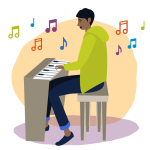How Music Affects Mental Health
 Music is a powerful tool for mood regulation and stress. The best part is, it’s always available to anyone who needs it.
Music is a powerful tool for mood regulation and stress. The best part is, it’s always available to anyone who needs it.
Benefits of Music
When it comes to your mental health, music can:
Help you rest better. A study involving students found that listening to relaxing classical music at bedtime improved sleep quality. This activity was also associated with decreased signs of depression.
Lift your mood. Research shows that listening to happier music can make you feel happier, especially if you try to lift your mood while listening. There’s also evidence that formal music therapy can help with depression when used alongside other therapies.
Reduce stress. If you’re feeling anxious or stressed, calming music can help to settle your mind. Several studies have shown that when people undergoing surgery hear calming music, they have lower blood pressure and need less pain medication than those who don’t listen to soothing music.
You don’t have to be preparing for surgery to calm yourself with music, though. Simply listening to music can decrease your blood pressure, lower your levels of the stress hormone cortisol, and reduce your heart rate.
Tips to Use Music to Improve Your Well-Being
Music therapists can help you find ways to use music for your mental health. This type of therapist learns how to use music-making and listening to help people understand and process their emotions. Like traditional mental health counseling, music therapy is customized to the needs of the client.
But you don’t necessarily need a therapist. You can also use music on your own to improve your mental well-being:
Listen to relaxing music. The best music for stress reduction is the kind that works for you. If you’re not sure where to start, look for music that plays at about 60 beats per minute. Researchers say that this tempo is best for encouraging the alpha brainwaves that signal a relaxed and conscious mind.
Express yourself with a beat. You don’t need to be a trained musician to make music. Anyone can grab a rhythm instrument like a drum or rain stick and create beats that are mournful, angry, joyful, or excited.
Create rhythms that express emotions you’ve been feeling. If you’d like you can talk about those feelings after the improvised storm has passed.
Write a song. The concept of songwriting can scare people away if they feel like the song won’t be “good.” Remember that when you use music therapeutically, it doesn’t matter what other people think of it. They never even have to hear it.
Create a mood playlist. If you’re feeling down, anxious, or upset, find a track that expresses how you feel. Feel those emotions and let the lyrics resonate with you. Then, gradually shift your listening choices so that the music takes you into a happier or calmer place. This is a popular technique used by music therapists.
Limits of Music as a Mood Booster
While music can be a powerful tool for regulating and shifting your emotions, it’s not a substitute for mental health treatment. If you have distressing emotional experiences that interfere with your ability to function, consider talking to a licensed mental health professional.
Excerpted from “How Music Affects Mental Health” in WebMD. Read the full article online.







